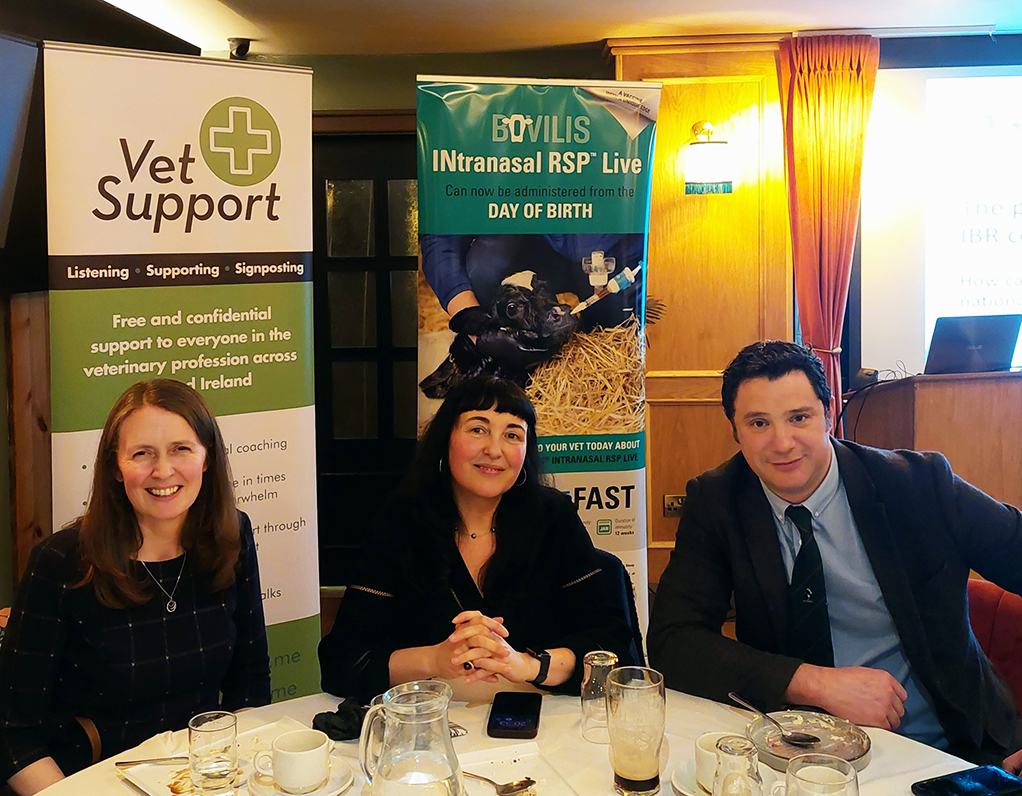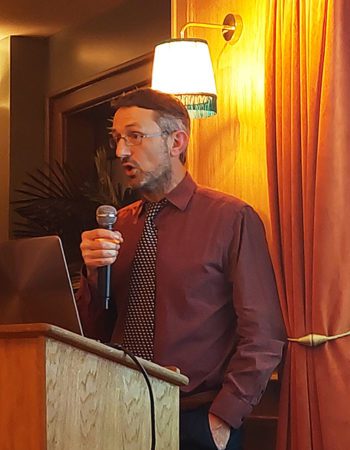11 Jun 2024
Sharon Verner and Iain Smith share their thoughts on a recent meeting held by two Northern Ireland veterinary associations.

From left: North of Ireland Veterinary Association president Sharon Verner, Animal Health Ireland’s Maria Guelbenzu and Association of Veterinary Surgeons Practising in Northern Ireland president Iain Smith.
More than 80 vets attended the joint spring meeting of Northern Ireland’s two veterinary associations, the North of Ireland Veterinary Association (NIVA) and the Association of Veterinary Surgeons Practising in Northern Ireland (AVSPNI).
The large turnout demonstrated the high level of interest in the topics being discussed, namely controlling infectious bovine rhinotracheitis (IBR) and the changing patterns of Haemonchus contortus, a parasitic roundworm. The meeting was addressed by two excellent speakers – Maria Guelbenzu, IBR and bovine viral diarrhoea (BVD) programme manager with Animal Health Ireland, and Eric Morgan, of The Institute for Global Food Security at Queen’s University, Belfast.
The meeting, which was sponsored by MSD Animal Health Ireland, was the first in a two-part series on “Reducing the consequences of endemic diseases of livestock”.

NIVA president Sharon Verner said: “The enthusiasm of local vets in engaging with these topics indicates that there is a strong will to work together with the farming community, scientists and decision makers to improve the health and welfare of ruminants.
“It is increasingly recognised that reducing the impact of endemic livestock diseases can have environmental and societal benefits and help mitigate climate change impacts.”
Dr Guelbenzu has extensive experience in the diagnosis and control of a wide range of viral, parasitic and bacterial diseases. Having previously worked as head of the disease surveillance and investigation branch of the Agri-Food and Biosciences Institute, she has been involved in several research projects related to endemic diseases of cattle and was awarded a PhD from Queen’s University Belfast on BVD diagnosis, epidemiology and control.
Dr Guelbenzu’s talk was titled “How can we eradicate IBR at the farm level and at the regional level?” and focused on the impact of IBR on the economic, environmental and social sustainability of farms.
It also covered the status of IBR control in other countries, best practice for controlling IBR at herd level and described the Irish approach to preparing for a national programme.
IBR is an endemic viral disease of cattle in Northern Ireland and poses significant challenges to farmers and vets.

Prof Morgan gained a PhD from the University of Warwick for studies on parasites of farmed and wild ungulates in Kazakhstan. He developed teaching and research interests in parasite transmission at the University of Bristol’s vet school, before moving to Queen’s University Belfast in 2017. He is the co-author of more than 150 peer-reviewed papers, focusing on understanding the impact of weather and climate change on infection patterns and how these can be managed.
Prof Morgan’s work is global, through various national and international initiatives, and across farmed, companion and wild animal systems. It uses predictive computer modelling and observations of field epidemiology.
In addition, he contributes to the development of sustainable parasite control strategies and implementing efficient and sustainable ways of managing parasite challenges to improve animal health, and to support livelihoods, animal welfare and conservation in a rapidly changing world.
In his talk, entitled, “Will Haemonchus become humongous?”, Prof Morgan discussed how haemonchosis cases are rising in the context of climate change scenarios, providing advice for practitioners to be able to adjust parasite control plans to take account of the specific pathobiology, epidemiology and diagnosis of H contortus. Internal parasites strongly affect the health of domestic and wild animals, and climate can be a key driver of infection patterns.
As both AVSPNI and NIVA work hard to ensure local vets have access to the latest scientific information available on topical issues, it was encouraging to see all sectors of the profession come together to hear two experts in the field.
A short presentation on MSD IBR vaccination strategies by MSD vet and ruminant veterinary manager Eleanor Brady complemented the talks from Dr Guelbenzu and Prof Morgan, and rounded off the evening perfectly.
AVSPNI president Iain Smith praised the quality of the talks, the level of engagement from all attendees and the high turnout of his fellow vets from the farm animal practice sector.
He added: “As ever, AVSPNI and NIVA are extremely grateful to our colleagues in MSD, as generous support from the company made this event possible.
“We look forward to working alongside them again to address other important animal health and welfare issues.”